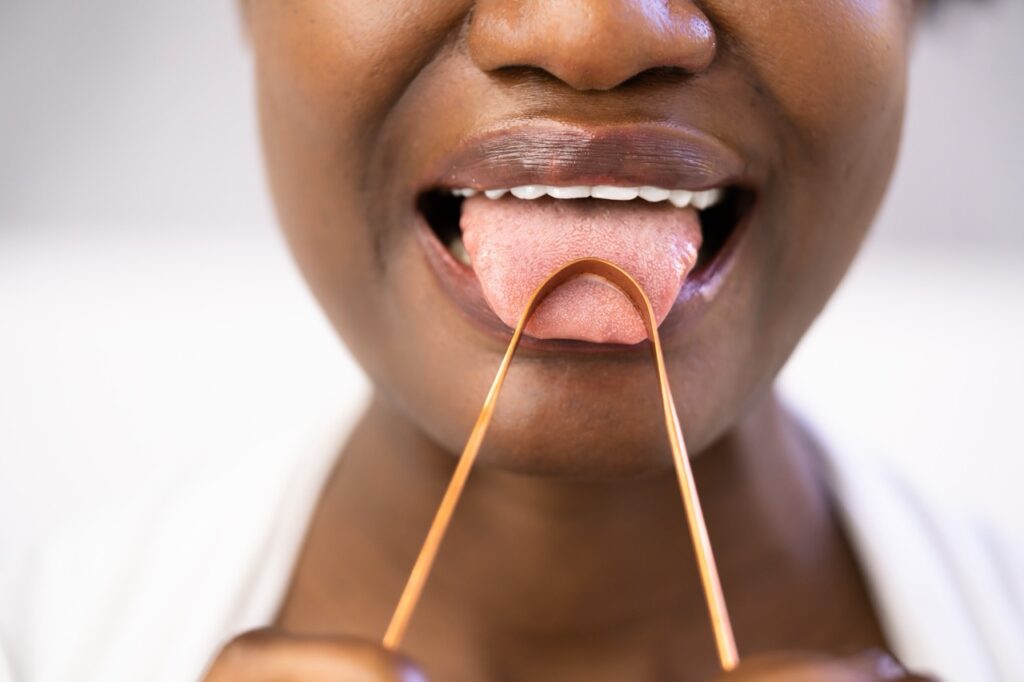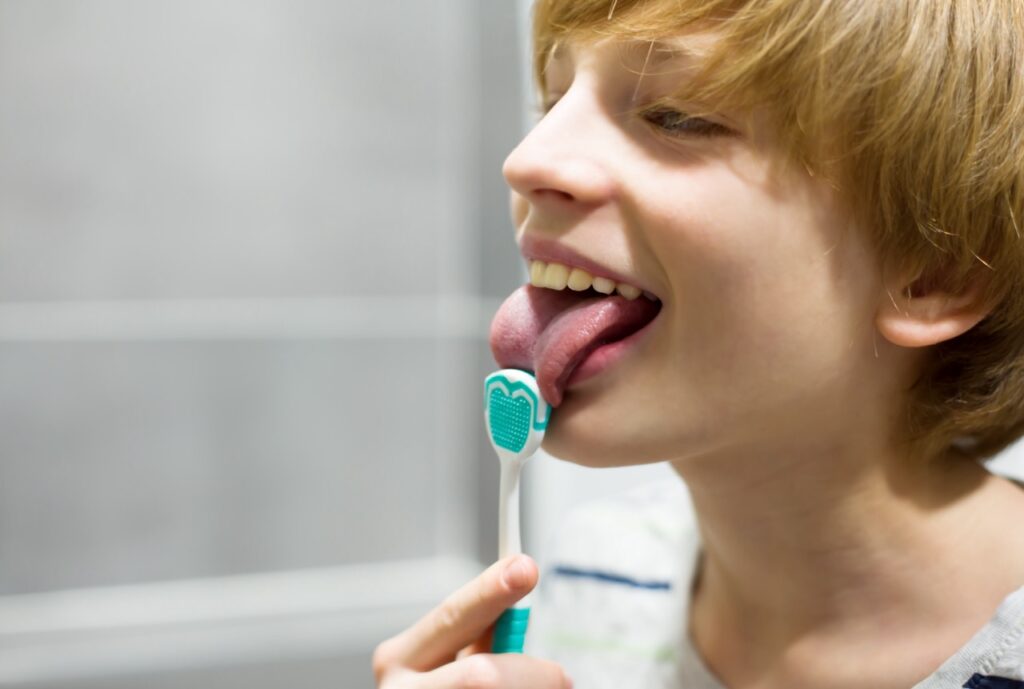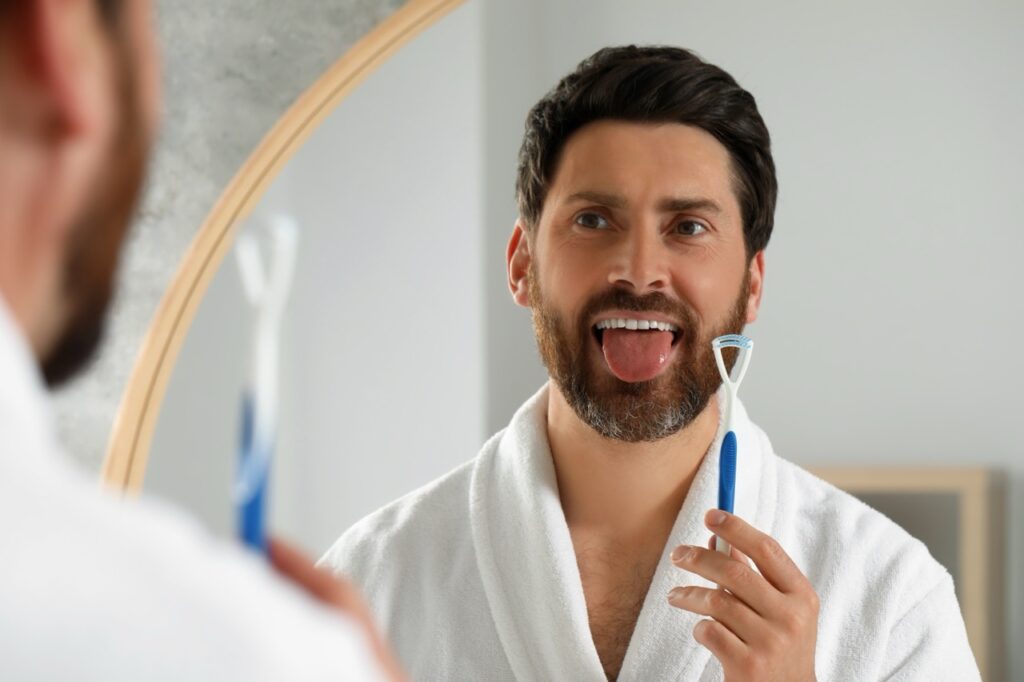Resource Library
Start Reading

Brush your teeth for two minutes twice a day? Bravo! Floss daily? Fantastic! You’re definitely on top of your oral hygiene routine.
Here’s something else you can think about doing to make your mouth cleaner and healthier: tongue scraping.
Before you throw up your hands in frustration (or throw a tube of toothpaste at us) and say, “There’s more I’ve got to do to keep my mouth healthy?” rest assured that scraping your tongue is not an absolute requirement for good oral health. That said, it’s an age-old practice that has become increasingly popular in modern oral care regimens because of its potential benefits.
So, what is tongue scraping, exactly? How can it help you and your mouth? Does tongue scraping work? Does it carry any risks? Keep reading for answers and advice.
 Tongue scraping is just what its name leads you to think it is. You sweep a tool—called, unsurprisingly, a tongue scraper—over your tongue’s surface three or four times in a “pretty intuitive” motion to remove accumulated food debris, dead cells, and excess bacteria.
Tongue scraping is just what its name leads you to think it is. You sweep a tool—called, unsurprisingly, a tongue scraper—over your tongue’s surface three or four times in a “pretty intuitive” motion to remove accumulated food debris, dead cells, and excess bacteria.
You can find both metal and plastic tongue scrapers. Metal scrapers are durable and easy to clean. Plastic scrapers are often flexible and come in many designs and colors. Although less durable than metal ones, plastic scrapers can be more gentle, making them better for people with heightened sensitivity or a pronounced gag reflex.
Other than making sure you don’t scrape too forcefully, you now have the basic information about tongue scraping you need.
Tongue scraping benefits include:
The tongue’s surface can harbor mutans streptococci, bacteria that are major contributors to tooth decay. By effectively removing these bacteria, tongue scraping acts as a preventive measure against both cavities (dental caries).
 Bacteria that accumulate on the tongue can lead to gum inflammation, which can progress to periodontal (gum) disease. Tongue scraping minimizes these bacteria, helps maintain gum health, and supports the prevention of gum disease.
Bacteria that accumulate on the tongue can lead to gum inflammation, which can progress to periodontal (gum) disease. Tongue scraping minimizes these bacteria, helps maintain gum health, and supports the prevention of gum disease.
Bacteria on the tongue can produce volatile, unpleasant-smelling sulfur compounds, leading to bad breath (halitosis). Regular tongue scraping can effectively reduce these compounds by eliminating the bacteria that produce them. As a result, your breath can be fresher.
When food debris and dead cells accumulate on the taste buds, the buildup can dull taste perception. When you regularly clean your tongue, you expose the taste buds more thoroughly to food and beverages, potentially improving how you experience flavors.
Even the most dedicated and diligent brusher of teeth may fall short in cleaning the tongue’s surface. Besides, the old advice about using the right tool for a given job applies. Where a toothbrush is designed to clean teeth, a tooth scraper is specifically designed to remove built-up bacteria, cells, and food particles from the tongue.
In addition, some people find using a toothbrush on the tongue triggers their gag reflex more than a tongue scraper. The scraper is usually flatter and glides smoothly over the tongue’s surface.
A scraper is also generally less abrasive than a brush, reducing the risk of irritation to the tongue’s delicate tissue.
 If you’ve never scraped your tongue before, you might experience the temporary activation of your gag reflex. This reaction may cause discomfort, but it will diminish as you get used to the process.
If you’ve never scraped your tongue before, you might experience the temporary activation of your gag reflex. This reaction may cause discomfort, but it will diminish as you get used to the process.
Excessive pressure during scraping can lead to small cuts or irritation on the tongue’s surface. To avoid these minor injuries, use gentle pressure, as excessive force may damage your taste buds.
A lack of improvement in your sense of taste may indicate the scraping is upsetting the healthy balance of bacteria and other microorganisms in your mouth (the oral microbiome).
Additionally, some people should exercise extra caution with tongue scraping:
As you should before any change in your oral hygiene routine, consult with your dentist before you start tongue scraping, or if you experience problems once you begin.
Tongue scraping doesn’t take the place of daily brushing and flossing. But it can be an effective complement to both. It can enhance your sense of taste, improve your breath, and significantly contribute to better oral health.
To learn more about how tongue scraping could become a beneficial part of your oral hygiene routine, talk with the professionals at Penn Dental Family Practice (PDFP). We’re eager to help you do all you can to keep your mouth happy and healthy.
Make your appointment online now or call us at 215-898-PDFP (7337).